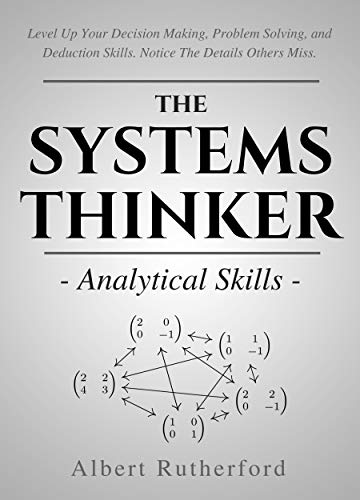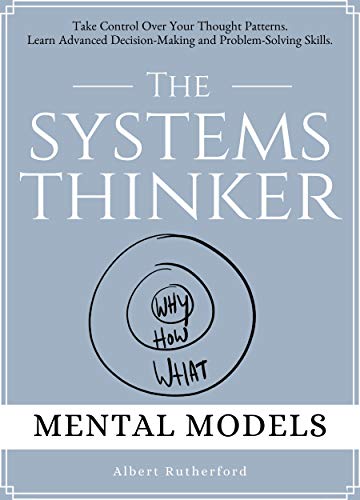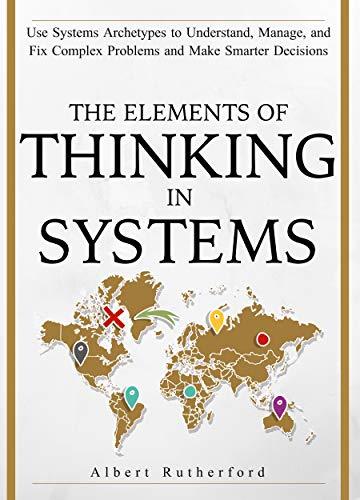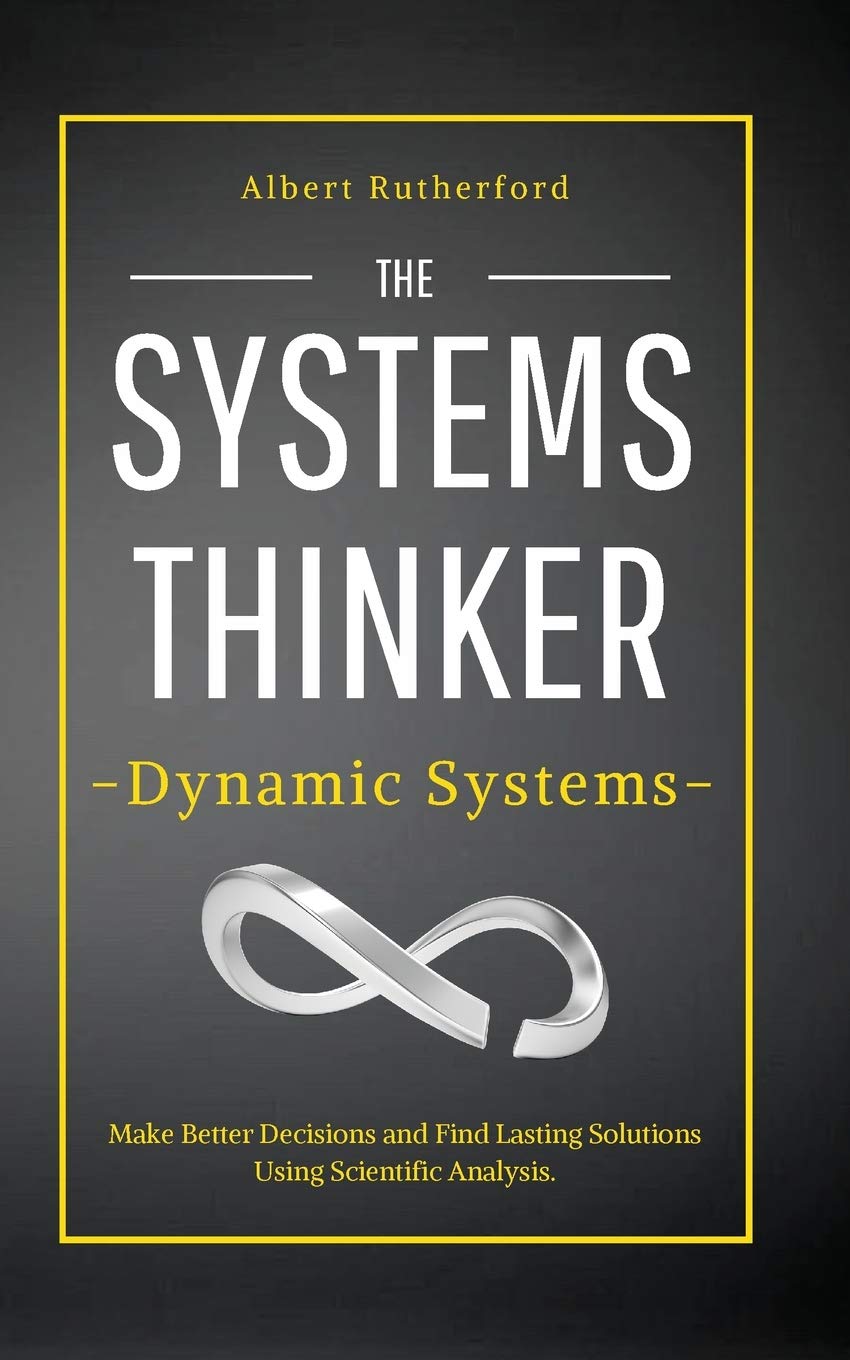


Books in series

#1
The Systems Thinker
Essential Thinking Skills For Solving Problems, Managing Chaos, and Creating Lasting Solutions in a Complex World
2018
Become a Systems Thinker and discover how to approach your life from an entirely new perspective.
What is systems thinking? Put it simply, thinking about how things interact with one another.
Why should this matter to you? Because you are a system. You are a part of smaller and larger systems – your community, your country, your species. Understanding your role within these systems and how they affect, hinder, or aid your life's fulfillment can lead you to better answers about yourself and the world.
Information is the most precious asset these days. Evaluating information correctly is almost priceless. Systems thinkers are some of the bests in collecting and assessing data, as well as creating impactful solutions in any context.
The Systems Thinker will help you to implement systems thinking at your workplace, human relations, and everyday thinking habits.
Boost your observation and analytical skills to find the real triggers and influencing forces behind contemporary politics, economics, health, and education changes.
Systems thinking clears your vision by teaching you to find not only differences but also similarities. This bi-directional analyzing ability will give you a more complex worldview, a more profound understanding of problems, and better solutions.
The car stopped because its tank is empty – so it needs gas. Easy problem, easy solution, right? But could you explain just as quickly why the price of gas rose by 5% the past month? After becoming a systems thinker, you’ll be able to answer that question with the same ease.
•What are the main elements, questions, and methods of thinking in systems?
• The most widely used systems archetypes, maps, models, and analytical methods.
•Learn to identify and provide solutions to even the most complex system problems.
• Deepen your understanding of human motivation with systems thinking.
The past fifty years brought so many changes to our lives. The world has become more interconnected than ever. Old rules can’t explain the new world anymore. But systems thinking can.

#2
The Systems Thinker - Analytical Skills
Level Up Your Decision Making, Problem Solving, and Deduction Skills. Notice The Details Others Miss.
2019
Enhance your logic, reason, judgment, and wisdom. Increase your ability to create concise and reasoned arguments using data and evidence, to get a genuine conclusion.
The Systems Thinker – Analytical Skills aims to raise the level of your mental performance by focusing on the fundamentals of how to use your mind effectively. This book will show you how to:
• Increase your ability to analyze problems and to comprehend what you read, hear, experience in a logical manner.
• Examine the logical structure of good and bad reasoning.
• Look at what type of evidence are decisions commonly based on.
• Detect common fallacies and rhetorical and psychological factors that can influence your thinking.
The book presents the methods that good problem solvers use in understanding complex ideas. It provides practice in applying these methods to a variety of comprehension, analytical, and reasoning questions. It also includes a number of logical thinking problems to hone your logical thinking skills.
Use these intellectual skills to analyze anything you might think about - questions, problems, disciplines.
• The most widely used forms of analysis.
• Guidance and practice to monitor your thoughts with the help of intellectual tools.
• Learn to question purposes, problems, information, and concepts.
• Interdisciplinary analytical tools to understand and assess your own reasoning, be it about a highly technical question or your everyday life.
The Systems Thinker – Analytical Skills helps you to find the most fundamental logic of any discipline, problem, or thesis. Transfer your knowledge between and among subjects and fields of observation.
• Learn four types of profound analysis.
• Learn to read and create statistical charts.
• Learn and correct the most frequent errors in reasoning.
• Learn to complement your analytical thinking tools with synthetic, systemic, critical, and creative thinking tools.
Good analytical thinking skills are deeply necessary if you are working in business, education, law, politics, and economics. Understanding the underlying structure of a problem can help you come up with the best solution.
Adopt analytical thinking skills to make better decisions, assess situations more accurately, and persuade other people with more success to consider your point of view. This book serves as a springboard toward analytic proficiency.

#3
The Systems Thinker - Mental Models
Take Control Over Your Thought Patterns. Learn Advanced Decision-Making and Problem-Solving Skills.
2020
Regain focus. Select relevant information. Make quick and clear decisions.
We are dealing with too many options, too much information, conflicting advice on general choices like what diet to choose, or who to choose as a mate. It’s hard to maintain focus and be confident in our decisions under such conditions.
The Systems Thinker –Mental Models helps you make decisions based on your relevant thought patterns and true values. Finding the most relevant information to YOU, the best decision to YOU is a matter of exploring YOUR thoughts and wants.
Mental models are cognitive frameworks that you can use to make order in your head, tune out the noise, and focus on what’s important – without getting overwhelmed. Mental models provide transparency, order, deeper understanding, context, and most importantly, a clear solution or conclusion about problems. Using systems thinking as your leading cognitive tool will provide depth AND width to your mental analysis.
Learn how corporate executives, economists, and policy makers analyze big data and make decisions based on it.
Discover 12 powerful thinking tools to facilitate your though processes
Understanding and model dynamic systems
Learn to use mental models through real-life examples
Mental models are so much more than a cognitive tool; they help with productivity, enhance understanding, boost critical thinking, and analytical skills.
Understand how corporations make multidimensional decisions
Learn to design your own mental models to map out your real priorities
Learn to include soft variables such as emotions into your analysis
Shift your mindset from blaming to accountability and resolve conflicts easier.

#4
Learn To Think in Systems
Use System Archetypes to Understand, Manage, and Fix Complex Problems and Make Smarter Decisions
2019
Would you like to have better solutions to your problems? Struggling to understand why things went wrong when you did everything right?
Learn to Think in Systems can help you with these problems.
Systems surround us and we might not even be aware of it. Your household is a system. The bakery on the corner is a system. Your class at school, your department at work, and your weekend soccer team made of wholehearted dads is a system too. You are a vital part of more complex systems like your country, the economy, or the world; learn about their changing nature, and find optimal solutions to problems related to them.
The world is more connected than ever thanks to innovations like telephone, television, computers, and internet. The way we sense reality changed significantly. Using conventional thinking to understand the world as it functions today is not enough. We need to know the elements of systems thinking to see beyond simple cause-effect connections. This book will help you to find strategic solutions to every complex, modern problem.
Learn To Think in Systems focuses on the nine fundamental system archetypes; our mental models related to them, and the step-by-step implication methods to fix them. Learn to use systems archetypes to solve your problems at work, in your business, in your relationship, and social connections.
See through the motivations and understand the drives of contemporary politics, economics, and education. Widen your perspective, think critically, analyze deeply, clear your vision, be more logical and rational just by applying systems thinking.
Think differently and get different results.
• Learn the language of systems thinking.
• Apply the best systems thinking ideas, models, and frameworks in your cognitive and decision-making process.
• Learn to understand, design, and find solutions to the main system problems called ‘archetypes.’
Complexity, organizational pathways, and networks gain more and more importance in our interconnected world. Learn To Think in Systems gives you real-life examples to make the adoption process of this type of thinking smooth.
Define your problems more accurately, find better, long-lasting solutions to your problems, learn to create strategic plans using systems diagrams, and understand your place and power over the world.

#5
The Systems Thinker - Dynamic Systems
Make Better Decisions and Find Lasting Solutions Using Scientific Analysis.
2019
Chaos and unpredictability dominate our world- affecting even the smallest of events. We often cannot predict how seemingly insignificant actions will alter our lives. This may lead us into rash decisions driven by the urge to regain control and quickly fix problems. But poorly considered decisions often create more problems for us than they solve.
This book is a primer on nonlinear system dynamics and chaos; how these forces shape our world and how to overcome their adverse effects. Reading this book will teach you to prepare for unpredictable events, and give you the tools to navigate the challenges of a chaotic world.
The Systems Thinker - Dynamic Systems sheds light on why sometimes life sometimes unfolds counterintuitively to expectations, how small changes can lead to tremendously big ones over time.
\- Learn the difference between linear and nonlinear systems and their effect on your life. - Deepen your knowledge about the additivity and homogeneity principle. - How to use synergy and interference in real life? - What are feedback loops and how can they generate equilibrium?
\- Detailed introduction to chaos theory and the butterfly effect. - Learn the importance of exponentials, power laws, long-tail distribution, phase transitions, bifurcation, and strange attractors. - Discover the world of fractals.
Get introduced to the world of chaos. Learn about the Raleigh-Benard instability, Metcalf's Law, Edward Lorenz's discovery of the Butterfly Effect, Benoit Mandelbrot's concept of fractals, the Koch snowflake and others.
Incorporate the concept of chaos and unpredictability into your life to -counterintuitively - find more peace and predictability.